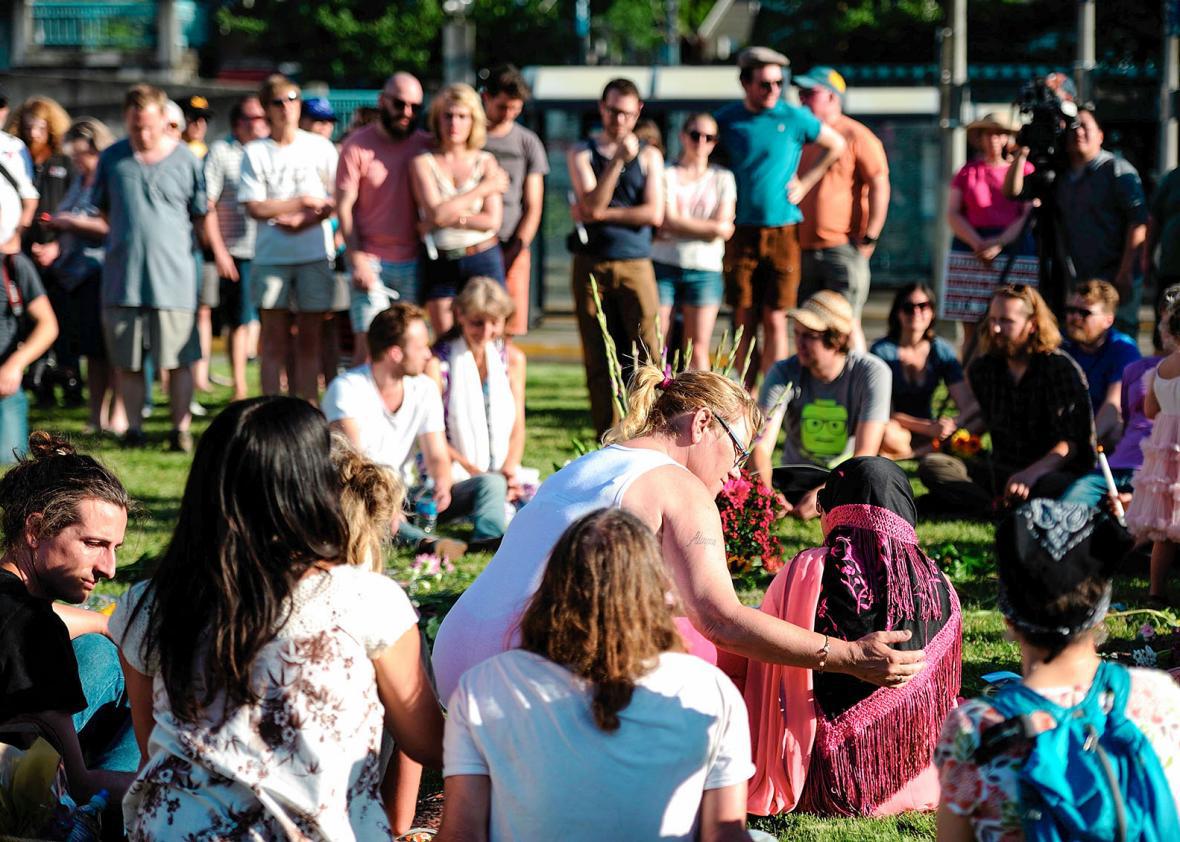In the aftermath of 9/11, a New York advertising executive came up with a catchphrase whose peculiar banality has become forever linked to its uselessness: “If you see something, say something.” The phrase has taken on, in its inadequacy, the stature of an extended joke. If you see what? What something should be said? And to whom exactly? The implied responsibility is both comically vague and expansive, as if our eternal vigilance for unattended bags is the thing that’s going to keep us all safe.
On Friday, however, some people saw and said some things, and two died for it. None of it involved luggage. In Portland, Oregon, three men tried to stop a man with a history of white supremacist rantings from verbally abusing two girls, one black, one wearing a hijab; the abuser drew a knife and slashed all three men in the neck. One Samaritan died on the scene, the other in the hospital. The third is recovering, after surgeons removed bone fragments from his throat. In a memorable detail reported by the Oregonian, the surviving victim’s clothes sat in an evidence bag at the hospital, soaked in blood.
Of all the various recent horrors, domestic and international, I’ve been trying to figure out why this one is so affecting. Some of it is in the assorted details: one of the victims was a 53-year-old veteran, registered Republican, father of four; the other, a 2016 Reed College graduate with a hippie name and, according to friends and family, a gentle demeanor. Both men, in their photos and postmortem profiles, have elements of stock characters—the bald and erect veteran, the shaggy liberal-arts grad—and much has been made of this odd coupling as especially tragic and inspiring. Human decency knows no type. There’s also the grisliness of the killings, the capacity of knives to still shock; the heroism of the dead, and the further heroism of witnesses who tried to save their lives, and succeeded in saving the third victim, a young poet, by quickly and coolly applying pressure to the wound. And, of course, the public transportation setting, where strangers are thrown together and the risk of conflict is always present at a low hum.
Some of the particularity is in the context of Portland, a city of noted contradictions that, despite its progressive reputation, is very white, with a troubling racial history. There is no place in America that can say it has moved beyond racial tension. Yet Portland’s specific paradox, as a place where a progressive struggle is being worked out mostly among a less-than-diverse set, has for some time felt like a testing ground for the white conscience. It’s hard not to think of the Portland stabbings, the white male perpetrator and the white men who tried to contain him, as both a failure of that test and a triumph. The dead are heroes for having intervened on behalf of two girls of color, and we also wish they had not had to do so.
Two deaths is not that many. The killings appear to have escalated from a confrontation the assailant had sought for some time. But it is this minor-keyness of the tragedy that has lingered with me—the everyday mundanity of harassment on a train, which has now taken on a new valence. I would like to think I am the kind of person who would say something; most people, I imagine, think the same of themselves. But even if goodness still has strength in numbers, those numbers feel less safe than they did before Friday. I worry that in a similar situation I may hesitate before saying something. And if we all do, then hate (and its chemistry with mental illness, as may have been the case here) has shaken off yet another social restraint. It will only grow bolder from here. For people of minority racial, religious, or sexual-identity groups, the Portland killings add another layer of anticipation and anxiety: that you can be attacked for who you are and also attacked for standing up for others. It feels like a small but new chapter in the various dangers available to us as Americans.
This is the terror that bubbles up not from without a society, as we continue to be warned, but from within. Rick Best and Taliesin Myrddin Namkai-Meche could not have known that standing up to it would cost them their lives. For the rest of us, the stakes are now that much clearer.
